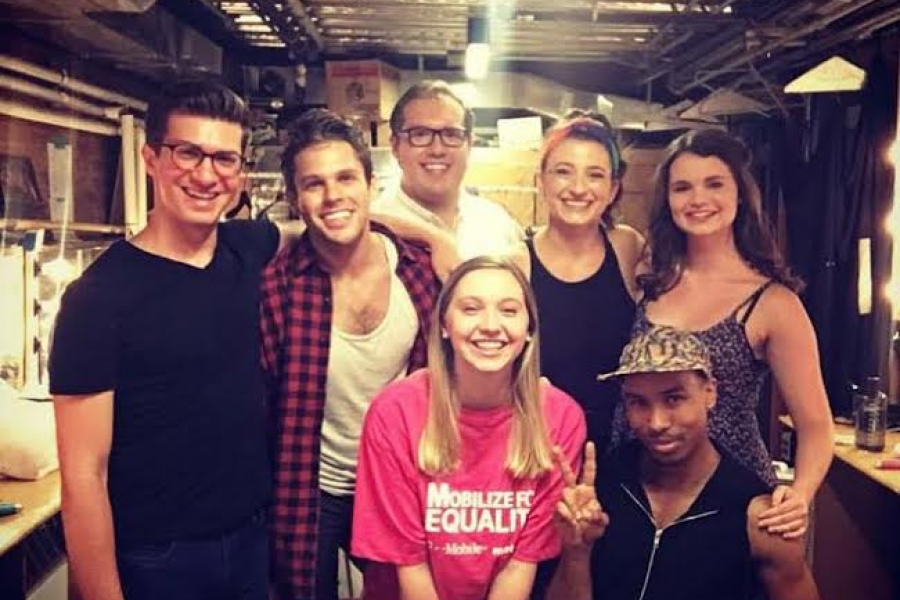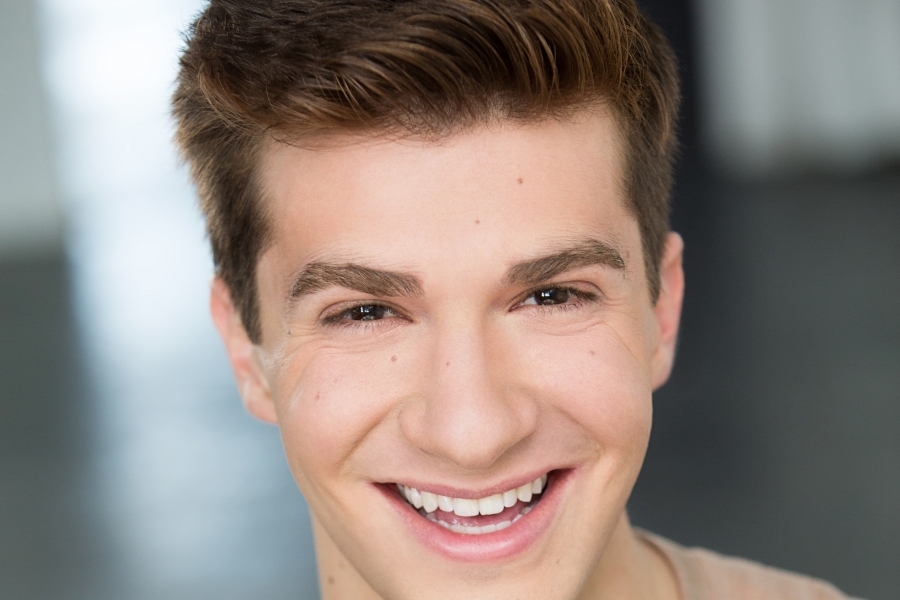
Among the offerings at GayFest!, a collection of LGBT-themed stage shows, is a workshop presentation of “INTERESTED IN,” which delves into the modern gay-dating scene.
Parker, a college student, has just come out. The play follows his awkward life as he plunges into the gay hook-up culture and begins to understand his new sense of identity and sexual freedom.
Playwright and New York City-based actor and director Michael Witkes describes himself as “an LGBT activist [who] strives to create and perform in theater that inspires social change, promotes acceptance and explores sexual identity and shame.” He earned a bachelor’s in theater at Muhlenberg College and was accepted by the Hangar Lab Company in Ithaca, N.Y., a training ground for emerging artists, where he trained as a director. He also studied theater at Queen Mary University of London.
The openly gay Witkes serves as the co-director, along with Ryan Atwell, and as one of the actors. Originally from the Philadelphia area, he now lives in New York City — like everyone in this show. For more information about his work, visit www.michaelwitkes.com.
PGN: When first did you realize that you loved theater?
MW: I’ve loved theater for as long as I can remember. My mom and dad took me to a lot of Philly theater shows as a child. I kept asking to see everything, and my parents thankfully kept taking me. I constantly performed little plays that I created for my parents and grandma as a kid.
PGN: As a young fellow, how did you cope with your growing awareness that you were gay?
MW: Growing up, I always knew that I was different from the other kids. I liked to play with Barbies, and I absolutely hated sports. When I first had feelings for another boy, I quickly buried and ignored them. I just hoped that they would eventually go away. In 2007, while waiting for the dentist, I vividly remember reading a magazine article about [actor] Tobey Maguire, who had just gotten married. My heart sunk to the bottom of my gut. That’s when I realized I had a crush on Spiderman — and that I was probably gay. I remember looking around shamefully at all the other people in the waiting room, hoping that they couldn’t tell what just happened.
PGN: Did you get harassed or ostracized by others when they realized that you were gay?
MW: I was definitely bullied as a child for being gay. Because of my personality, and the way that I carried myself, I was never one of those kids that could hide. In the sixth grade, the “popular boys” literally told me I had to sit at the girl’s table because I was gay. But when I got to high school, I found my people. I became really close with all of the theater kids. Many of them are still some of my best friends. They and my family were all extremely supportive after I came out. It was a difficult process, but everyone welcomed me with open arms.
PGN: “INTERESTED IN” explores “life after the closet” by following a young man and his development as an individual who also identifies with the gay community.
MW: Yes. I started writing the play because I felt that gay narratives in theater lacked stories after “the closet.” Almost all of the plays about young gay men ended with the main character coming out or committing suicide. But as someone who was recently out at the time, I wanted to know what happened after the closet. I wanted to write a story where gay characters lived through their shame. After I came out, I thought that I would magically accept my sexuality, but I soon realized that coming out was only one step in a much larger journey towards self-acceptance.
PGN: Apparently, Parker, the main character in your play, knows how to handle the technical aspects of meeting partners by using dating apps.
MW: Yes, Parker meets most of his “partners” using the dating app Grindr. He meets them in public or at their homes. Some he even meets in real life; crazy for 2016, right? But he’s newly out, so he’s learning about all the do’s and don’ts of gay “hook-up” culture.
PGN: What experiences do you and your theater friends have with the psychological impact on young members of the LGBT community who are navigating gay hook-up culture?
MW: The play is definitely a commentary on present-day hook-up culture. All of the dating apps can really depersonalize the experience. It’s easy to say whatever you want over text, which can lead to people behaving rudely toward one another. But it’s also absolutely possible to find love through dating apps. It brings people together that, otherwise, might never have come in contact with one another. Part of Parker’s journey is figuring out what he wants in a potential partner, and how he chooses to navigate dating culture.
PGN: If modern technology and an overall “free-for-all” of the sexual revolution led to an almost 24/7 addiction of quite a few members of the LGBT community, what happened to platonic gay male friendships in 2016?
MW: It was extremely important for me to portray platonic friendship between young gay men. The friendship between Parker and Danny, played by the fiercely talented Thomas Countz, is, in many ways, the core of the play. It’s two people who love each other and support each other, no matter what — but in no way would they be romantic or sexual partners. In a community where anonymous sex is so easy, it’s important to have someone like Danny to confide in.
PGN: Tell us about the possible dangers for young adults who may label others or who may get labeled themselves.
MW: It was initially hard for me to label myself as gay. I was taught that it was one of the worst things to be and it was used as a slur throughout my adolescence. But the term “gay” perfectly described my sexuality, my feelings and my identity. I’ve learned to push past any shame and embrace it. But once I came out, I discovered that there was a slew of other labels specifically for the gay community: bottom, top, vers[atile], twink, bear, etc. “INTERESTED IN” explores the juxtaposition between being empowered by labels and being limited by them. Sexuality is extremely complicated. I have friends that are all over the spectrum. The important thing is that they find something that works for them, which might even mean omitting labels all together.
PGN: Sex used to be a taboo subject in Victorian England and many other societies — unlike death and dying, subjects that were discussed freely. It seems that today the opposite is true in the U.S., probably due to both the sexual revolution of the 1960s and ’70s and modern media, which gives young adults access to any information under the sun.
MW: While we’ve definitely progressed as a society about our feelings towards sex, I think we still have a long, long way to go. Sex is still taboo, especially gay sex. I remember my high school sex-ed class’ discussion about gay sex comprised of watching the movie “Philadelphia.” And although that’s a fantastic film, it basically just taught me that gay sex kills. There is so much shame related to gay sex. I want to put it on stage so people will start talking about it more freely and hopefully eliminate this feeling that it’s wrong or shameful in any way.
PGN: The program described “INTERESTED IN” as “a workshop presentation of an exciting new gay play.”
MW: “INTERESTED IN” is still a work in progress. For the workshop production, we use the minimum number of sets, costumes and props that allow the audience to follow the story. The same team presented the only other workshop production of this play in early July at Dixon Place in New York City. I’ve made a few edits to the script since then. So, I’m hoping that the GayFest! production will help me more clearly finalize the script. I can imagine the play all I want in my mind, but I’ll never know what works until it’s in front of an audience. After the play is finalized, we’ll hopefully be able to mount it with fully developed design elements and an extended run.
PGN: Ultimately, would it be fair to say that “INTERESTED IN” centers on finding one’s community, one’s place where one can belong — one’s second family?
MW: The first time I ever went to a Philly gay bar was for my 21st birthday. I really love the Philly gay scene because it feels like a community. I remember leaving that night and telling my best friend that I felt like I found a new home — a place where I could truly be myself. Safe spaces are very important for queer people because we don’t always have the privilege to “be ourselves” on a day-to-day basis. Gay bars can be our sanctuaries. However, every gay experience is wildly diverse. Parker is plunged into this new community, but he needs to figure out where he fits in.
The staged reading and workshop presentation of “INTERESTED IN” takes place 7 p.m. Aug. 24 at the Louis Bluver Theatre at the Drake, 302 S. Hicks St. The show runs approximately 60 minutes without intermission and is followed by a Q & A session. For tickets to this and any other GayFest! 2016 shows click here.
